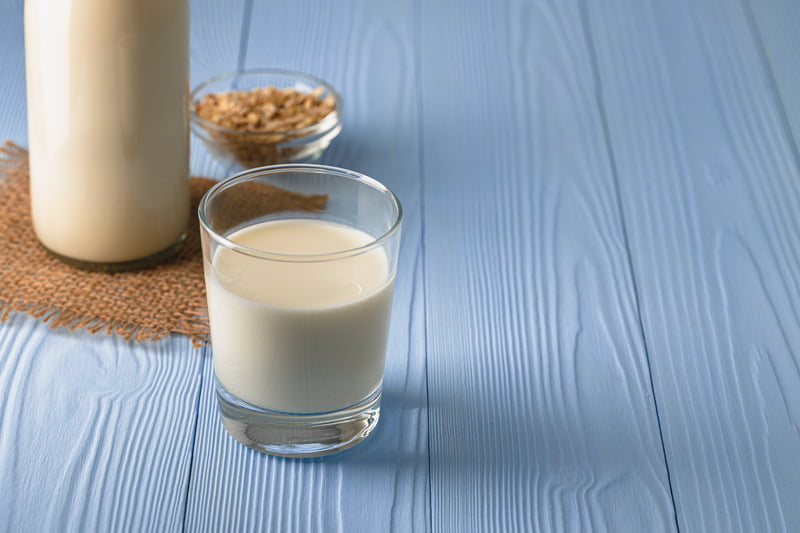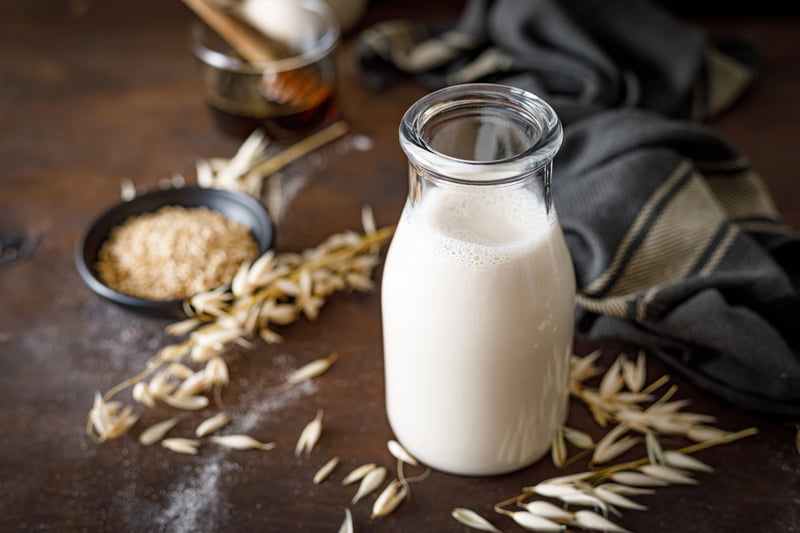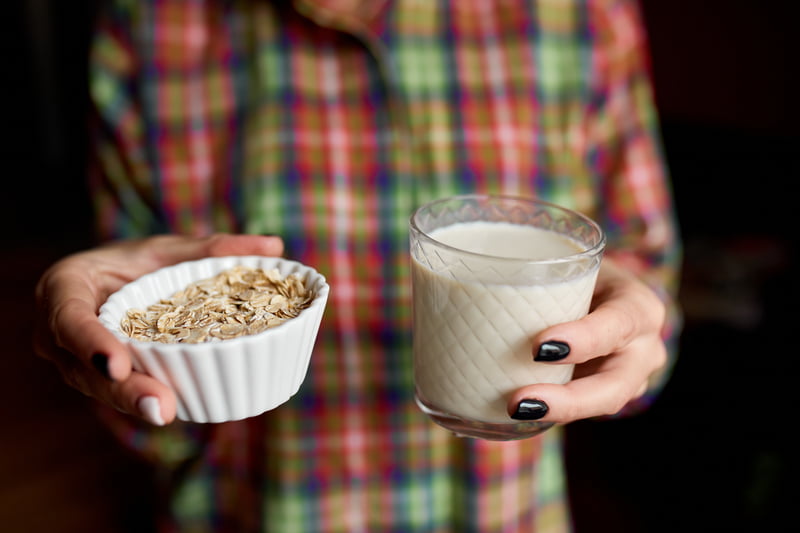Breastfeeding women use the food in their bodies to create nutrient-rich milk for their babies.
If breastfeeding, you need around 300 to 400 extra calories of nutrient-dense foods with iron, calcium, and protein to produce a solid milk supply daily.
If you’re focusing on a plant-based diet, you may wonder if a non-dairy milk alternative like oat milk is a good choice while breastfeeding.
Explore the benefits for women of drinking oat milk while breastfeeding, including how it can help you increase your milk supply and what brands are the best option.
Can Women Drink Oat Milk While Breastfeeding?
Yes. Women can absolutely drink oat milk while pregnant or breastfeeding.
Oat milk offers a myriad of health benefits to women who drink it.
One cup (around 8 ounces) of unsweetened oat milk that contains only salt, vanilla extract, oats, and filtered water has:
- Calories: 80
- Fat: 1.5g
- Sodium: 160mg
- Carbohydrates: 14g
- Fiber: 2g
- Protein: 4g
- Iron: .6mg
This nutritional profile means that if you drink about two cups of oat milk daily, for instance, in your cereal or non-caffeinated tea, you get 4 grams of fiber, 8 grams of protein, and .12 mg of iron.
That’s about 19% of your recommended fiber intake and 10% to 17% of your recommended daily protein intake, depending on your size.
Oat milk contains a minimal amount of fat compared to dairy milk (1.5 grams of fat for oat milk to 4.9 grams in 2% dairy and 8 grams in whole milk).
This makes it a good choice for those looking to reduce their saturated fat intake for heart health.
The fiber in oat milk helps regulate blood sugar and keeps your digestive system moving smoothly.
This can aid your overall health and mood due to the gut-brain axis connection between your digestive system, brain, and hormones.
Some oat milk brands offer further health benefits through fortification.
Fortified oat milk is typically found in store-bought brands and includes additional nutrients and vitamins.
These include calcium, Vitamin D, Vitamin E, and folic acid.
Folic acid is essential for pregnant and breastfeeding mothers, making oat milk an excellent option.
Does Oat Milk Help Increase Your Breastmilk Supply?
Lactating mothers must eat sufficient food to keep up their milk supply.
The body uses incoming nutrients to produce breast milk more readily than digging into its reserves, so what you take in through your diet can impact your breast milk supply within a few hours.
Helps Support Iron Intake
Since it is made from whole grain oats, oat milk has a reputation for helping mothers increase and maintain their milk supply while breastfeeding.
Oat milk contains iron, a much-needed nutrient for those who are breastfeeding.
Pregnant and lactating moms often suffer from anemia, a condition indicated by a lack of red blood cells due to low-iron intake.
When you lack red blood cells, your body has trouble moving oxygen to crucial areas, making you nauseous, dizzy, lightheaded, and tired.
It also greatly impacts your ability to create enough breast milk for your baby.
Pregnancy is the number one cause of anemia for most women, and nearly 30% of women continue to suffer from anemia postpartum.
A 2015 study on breastfeeding mothers in Ethiopia found that mothers with anemia often produce insufficient milk for their babies.
It also found evidence that the quality of a mother’s breast milk is affected by this lack of iron in the body.
For breastfeeding mothers, the RDA of iron is 9 mg per day (ages 19 to 50) and 10 mg per day (ages 14 to 18).
While taking a prenatal vitamin for around six to eight weeks post-delivery is essential, you can also supplement your iron intake with foods rich in iron, such as oatmeal and oat milk.
Oat products can help boost your iron intake and prevent anemia, which can have a beneficial impact on milk production.
Additional Nutrients
Oats contain additional nutrients that can help boost your milk supply when breastfeeding.
The fiber, calcium, and protein, along with phytochemicals and beta-glucans t, can elevate the quality of your breast milk.
Nutrients like fiber can help you feel full and satisfied, while calcium helps your bones stay strong and healthy.
Because your body uses calcium stores, it's important to drink fortified oat milk with the same amount of calcium as dairy milk to ensure your stores don’t run low.

How Much Oat Milk to Drink While Breastfeeding?
There is no specific amount of oat milk you should drink while breastfeeding.
However, you can base your oat milk consumption on nutrient and caloric needs as they fit into your overall diet and the type of oat milk you are consuming.
For example, if you are drinking oat milk to boost your caloric intake by 300 to 400 calories, you would aim for about 3 to 4 8-ounce glasses of milk per day.
Each cup has around 90 to 130 calories, depending on the brand.
If you drink oat milk for its fiber, calcium, or protein content, you’d want to compare nutrient labels and consider your diet as a whole.
For instance, some oat milk has more calcium than others, so you’d want to choose the brand that contains nutrients you need to supplement your diet.
One element to remember is that it takes about four to six hours ( sometimes 24 hours) for your body to turn the food you eat into breast milk for your baby.
If you’re drinking oat milk to ensure a healthy supply of breast milk and increase its vitamin and nutrient profile, you’ll want to drink a few glasses per day, spaced throughout the day.
Of course, it's important also to remember that you should not rely on oat milk for your daily nutrient needs.
It's always beneficial to cultivate a well-rounded diet of fresh fruits and vegetables and healthy grains when pregnant or breastfeeding and take a prenatal vitamin.
Oat milk can supplement a plant-based approach in this respect.

Ways to Use Oat Milk While Breastfeeding
You can use oat milk in several ways to benefit from its nutrients while breastfeeding. Ideas for using oat milk include:
Coffee or Tea
You may use oat milk as a creamer in coffee or tea when breastfeeding. While some opt for non-caffeinated beverages at this time, the CDC states that up to 300 mg of caffeine (2-3 cups of coffee) is safe while breastfeeding.
Rather than use regular oat milk, which can curdle or separate in hot liquids, you can use barista oat milk. Barista oat milk is specially formulated oat milk that is made to withstand hot temperatures and mimic the creamy, foamy texture of dairy milk in these drinks.
Cereal
You can use oat milk instead of dairy milk in your morning (or snacktime) cereal. Opting for unsweetened oat milk can help you reduce your sugar intake, which benefits your overall health.
However, you can find sweetened oat milk if you prefer to mimic the sweetness of dairy milk more closely.
Savory Recipes
You can use oat milk in savor recipes such as mac ‘n cheese, pot pies, and sauces.
In most instances, you’ll use the oat milk in a 1:1 ratio to replace dairy milk in these recipes to give it a different nutritional profile, including more fiber and lower calories.
Baking
Similar to savory recipes, you can use oat milk in baking while breastfeeding.
Oat milk works well in baking recipes like muffins, scones, pancakes, waffles, and baked oatmeal.
You can try oat milk in a healthy plant-based recipe to get more nutrients and vitamins in your baked goods while breastfeeding.

Considerations For Drinking Oat Milk While Breastfeeding
Oat milk offers multiple advantages to breastfeeding mothers; however, there are a few considerations to take into account when thinking about drinking oat milk during this time:
Lack of Certain Nutrients
While oat milk contains plenty of excellent nutrients, it's important to check the label to understand what it may be lacking.
For example, some brands use minimal ingredients, making a healthier beverage. Without fortification, however, they might not have vital elements like calcium or Vitamin D.
If you aren’t eating a well-rounded diet or taking a prenatal vitamin while breastfeeding, you may need to switch to a fortified version of the beverage for better health benefits.
Not Suitable For Mothers With Celiac or Gluten Sensitivity
Oat milk is well-tolerated by most people, but if you have Celiac Disease or gluten sensitivity, oat milk may cause problems with your stomach or digestive system.
Oats do not contain gluten but are often grown and processed with wheat.
You can still drink oat milk if you have these conditions, just make sure to look for packages that certify that the oat milk is gluten-free.
May Cause Digestive Issues
If you have an oat allergy or sensitivity to fiber, you may also experience digestive discomfort after drinking oat milk.
The drink has more fiber than dairy milk, which can cause upset if you already have a high-fiber diet or are sensitive to fiber.
Enjoy Oat Milk While Breastfeeding
The bottom line on oat milk and breastfeeding is that oat milk is a healthy alternative to dairy and other plant-based milk.
It’s a good choice for those with nut allergies who still want the benefits of a plant-based or vegan diet.
Oat milk is considered one of the most environmentally friendly plant milk, and it can help you increase your milk supply to help nourish your little one while breastfeeding.
